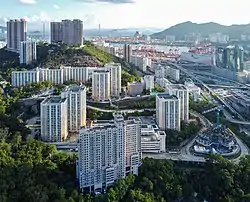Lai Yiu Estate
Lai Yiu Estate (Chinese: 麗瑤邨) is a public housing estate in Lai King, Kwai Chung, New Territories, Hong Kong. It is located near Central Kwai Chung Park and Castle Peak Road (Kwai Chung Section).[3] It is located at the north mid-level of Lai King Estate and it consists of five residential buildings completed in 1976, 1977 and 1999 respectively.
| Lai Yiu Estate | |
|---|---|
 Aerial view of Lai Yiu Estate | |
| General information | |
| Location | 11 Lai Yiu Street, Lai King Kwai Chung New Territories, Hong Kong |
| Coordinates | 22.354°N 114.131°E |
| Status | Completed |
| Category | Public rental housing |
| Population | 8,254[1] (2016) |
| No. of blocks | 5[2] |
| No. of units | 2,841[2] |
| Construction | |
| Constructed | 1976 |
| Authority | Hong Kong Housing Authority |
Tsui Yiu Court (翠瑤苑) is a Home Ownership Scheme housing court in Lai King. It is located near Lai Yiu Estate, Lai King Fire Station and Castle Peak Road (Kwai Chung Section). It has a single residential block completed in 1981.[4]
Houses
Lai Yiu Estate
| Name[2] | Chinese name | Building type | Completed |
|---|---|---|---|
| Fu Yiu House | 富瑤樓 | Twin Tower | 1976 |
| Kwai Yiu House | 貴瑤樓 | 1977 | |
| Lok Yiu House | 樂瑤樓 | ||
| Wah Yiu House | 華瑤樓 | Old Slab | |
| Wing Yiu House | 榮瑤樓 | Small Household Block | 1999 |
Tsui Yiu Court
| Name[4] | Chinese name | Building type | Completed |
|---|---|---|---|
| Tsui Yiu Court | 翠瑤苑 | Non-standard | 1981 |
Demographics
In 1990, the Gross Estate Area of Lai Yiu Estate was 6.1 ha. The authorized population was 13,258 and the theoretical density was 2,173 persons/ha. The actual density was 1,437 persons/ha.[5] As of September 2021, the authorised population of Lai Yiu Estate was 8,000.[2]
According to the 2016 by-census, Lai Yiu Estate had a population of 8,254. The median age was 46.8 and the majority of residents (94.2 per cent) were of Chinese ethnicity. The average household size was 3 people. The median monthly household income of all households (i.e. including both economically active and inactive households) was HK$24,950.[1]
Politics
Lai Yiu Estate and Tsui Yiu Court are located in Wah Lai constituency of the Kwai Tsing District Council.[6] It was formerly represented by Sin Chung-kai, who was elected in the 2019 elections until May 2021.[7]
See also
References
- "Major Housing Estates". 2016 Population By-census. Census and Statistics Department. Retrieved 8 February 2022.
- "Housing Authority Property Location and Profile | Hong Kong Housing Authority and Housing Department | Hong Kong Housing Authority and Housing Department". Hong Kong Housing Authority. Retrieved 8 February 2022.
- "Central Kwai Chung Park". Leisure and Cultural Services Department. Retrieved 8 February 2022.
- "Housing Authority Property Location and Profile | Hong Kong Housing Authority and Housing Department | Hong Kong Housing Authority and Housing Department". Hong Kong Housing Authority. Retrieved 8 February 2022.
- Lai, Lawrence Wai-Chung (1990). "Public housing density in Hong Kong: A theoretical and empirical review". Ekistics. Athens Center of Ekistics. 57 (342–343): 160–171. ISSN 0013-2942.
- "Recommended District Council Constituency Areas (Kwai Tsing District)" (PDF). Electoral Affairs Commission. Retrieved 8 February 2022.
- "Kwai Tsing District Council - List of Former Kwai Tsing DC Members". District Council. Retrieved 8 February 2022.